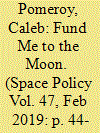|
|
|
Sort Order |
|
|
|
Items / Page
|
|
|
|
|
|
|
| Srl | Item |
| 1 |
ID:
167315


|
|
|
|
|
| Summary/Abstract |
Since the formation of the People’s Republic of China in 1949, Science and Technology (S&T) has been the focus area for Chinese economic development. However, little was known about China’s scientific mission, working and policies till the end of 1978. Based on the studies and the developments made, one can say that China’s S&T policy has evolved through four phases. The first phase (1949–1959) supported the development of heavy industries along the Soviet lines; the second phase (1959–1976) witnessed economic stagnation and ideological domination of technology projects; the third phase (1976–2001) focused on market-driven and product-driven research and now in her fourth phase of S&T development, since 2002, China has aimed to develop high technology industries and the nascent clean-energy or green technology with a focus on innovation.
These policy changes entirely reformed the way China’s industrial enterprises are being managed today as compared to earlier years. However, some thinkers do not consider these reforms as sweeping or successful. In order to better appreciate the implications of the S&T policy in China’s industrial transition, the article analyses the role and effects of the policy that has assisted in enhancing the country’s S&T strength and improving the competitiveness, while supporting its economic and social development.
|
|
|
|
|
|
|
|
|
|
|
|
|
|
|
|
| 2 |
ID:
169296


|
|
|
|
|
| Summary/Abstract |
The likes of Elon Musk and Jeff Bezos now occupy the headlines once dominated by Apollo and Soyuz. Described as New Space versus Old Space, debate surrounds the emerging commercial space industry and the role of nontraditional actors in the evolving contemporary space exploration environment. This article enters this debate by adopting a sociological approach to investigate the role of crowdfunding in financing space exploration today. We interviewed crowdfunded space project creators in disparate locations, from Moscow to Silicon Valley, who attracted capital ranging from $200 to over $1 million. We attempt to uncover their experiences using this distinctly social financing mechanism and find that although crowdfunding is unlikely to solve all of today's research funding conundrums, it does appear to increase access to space in unique ways. We argue, however, that the most interesting dynamic of this phenomenon is the way in which crowdfunding contributes to an increasingly democratic exploration environment and how this might impact space science research and the power structures of the space industry. This article concludes by considering possible implications of this trend and derives practical suggestions for both policymakers and individuals who may be considering the use of crowdfunding to finance space science research and exploration projects.
|
|
|
|
|
|
|
|
|
|
|
|
|
|
|
|
| 3 |
ID:
189291


|
|
|
|
|
| Summary/Abstract |
Japan has a well-developed public infrastructure for supporting scientific research, including promoting research in the private sector. This infrastructure includes government agencies that develop and implement science and technology policy; an institutionalized system of state plans and programs to support and fund research; and legal entities established by the government that oversee the use of funds allocated for this purpose. The public infrastructure is supplemented by research and analysis organizations and units of the private sector, which account for more than 80% of total R&D expenditures. Universities, including their research centers and institutes, play a significant role in the organization of R&D.
|
|
|
|
|
|
|
|
|
|
|
|
|
|
|
|
| 4 |
ID:
074871


|
|
|
|
|
| Publication |
Amsterdam, IOS Press, 2006.
|
| Description |
viii, 191p.
|
| Series |
NATO Science series 5, Science and Technology Policy; vol.51
|
| Standard Number |
1586036467
|
|
|
|
|
|
|
|
|
|
|
|
Copies: C:1/I:0,R:0,Q:0
Circulation
| Accession# | Call# | Current Location | Status | Policy | Location |
| 051896 | 363.32072/JAM 051896 | Main | On Shelf | General | |
|
|
|
|
| 5 |
ID:
175059


|
|
|
|
|
| Summary/Abstract |
Over the past two decades, scholars have developed undone science and inclusive innovation to explain knowledge silos, technology and development for marginalised communities. The undone science framework describes the systematic neglect of scientific issues that impact marginalised groups. The inclusive innovation framework emphasises the need to produce innovations that directly benefit marginalised groups. Despite the similar goals of the frameworks, the undone science and inclusive innovation theoretical communities have not interacted with each other, and as a result, the insights from each framework fail to help other disciplines improve opportunities for marginalised groups. This article compares the frameworks by examining nanotechnology policy and research in South Africa and shows how the frameworks help create better policies for marginalised groups. Because the frameworks emphasise different issues, policymakers should use both frameworks as opposed to over-relying on one of them.
|
|
|
|
|
|
|
|
|
|
|
|
|
|
|
|
|
|
|
|
|